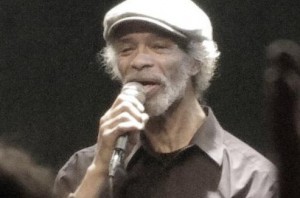Gil Scott-Heron Dead At 62, Whitey No Longer On The Moon
 Influential poet and social critic Gil Scott-Heron died Friday afternoon, reportedly after falling ill following a trip to Europe. Scott-Heron is best known as a powerful voice of black culture, but his influence extends across color lines. His arguably most famous work, The Revolution Will Not Be Televised, was a prescient media critique whose title credo has embedded itself in the American cultural vocabulary. My favorite Scott-Heron piece, though, is the even more prescient health care-and-taxes rant Whitey on the Moon.
Influential poet and social critic Gil Scott-Heron died Friday afternoon, reportedly after falling ill following a trip to Europe. Scott-Heron is best known as a powerful voice of black culture, but his influence extends across color lines. His arguably most famous work, The Revolution Will Not Be Televised, was a prescient media critique whose title credo has embedded itself in the American cultural vocabulary. My favorite Scott-Heron piece, though, is the even more prescient health care-and-taxes rant Whitey on the Moon.
Gil Scott-Heron never achieved widespread fame, but his influence, particularly on black culture, looms larger than any platinum record. Sometimes credited as the “Godfather of Rap,” a label he resisted, Scott-Heron’s footprint on hip-hop derives more from his broader social significance than his music. Ironically, another hip-hop originator, DJ Kool Herc, is currently suffering through a medical crisis that has turned into a financial one, much like the protagonist of Whitey on the Moon.
My introduction to Scott-Heron came by way of a friend who was an obsessive Howard Stern fan, and who played me a homemade tape of Stern mocking Whitey on the Moon (that’s what we used to do instead of iTunes, or Napster, or…ask your dad). Stern, of course, misunderstood the poem as a commentary on the absurdity of the space program, rather than on the absurdity of poverty in a nation that could put a man on the moon.
Even though Whitey is technically not on the Moon anymore (although we do maintain a physical presence there), the piece is as relevant today as it was then, if not more. Scott-Heron manages to unite the populist grievances of liberals (lack of health care) and Tea Partiers (taxes takin’ their whole damn check) alike. Aside from the poem’s brilliance, I have also always marveled at Scott-Heron’s patience at not losing it when a member of the audience spoils the last line (listen carefully after “Air-Mail special…”):
One of Scott-Heron’s more popular chart successes was the oddly jubilant, jazz-inflected anti-Apartheid anthem Johannesburg:
His most enduring legacy in the broader American popular culture, and the piece that propelled his early success, is The Revolution Will Not Be Televised. It’s a searingly brilliant criticism of our media-doped society that achieves, in minutes, what the (also brilliant) film Network takes hours to do. Sadly, its credo has been reduced to a political rally cliché, but the commentary remains powerful in an era in which revolutions, and everything else, actually are televised (and Facebooked, and Twittered):
In the 80s, though, Scott-Heron began a long struggle with drug abuse, and his production fell off sharply. In 2010, though, he released his first album in 16 years, entitled I’m New Here, which peaked at #5 on Billboard’s Jazz Albums chart, and #38 on the R&B chart. His passing will surely stir interest in Scott-Heron’s musical catalog, and hopefully a resurgence in his influence over modern artists.
This is an opinion piece. The views expressed in this article are those of just the author.
New: The Mediaite One-Sheet "Newsletter of Newsletters"
Your daily summary and analysis of what the many, many media newsletters are saying and reporting. Subscribe now!






Comments
↓ Scroll down for comments ↓